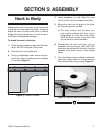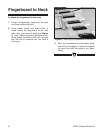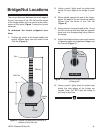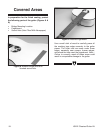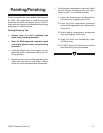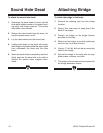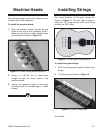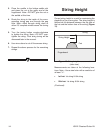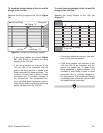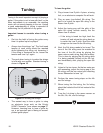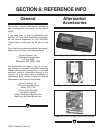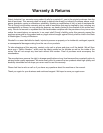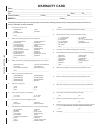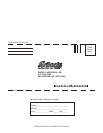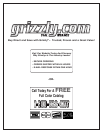
-16-
H3122 Classical Guitar Kit
Tuning is the most important concept of playing a
guitar. If the guitar is not in tune with itself, or the
other instruments in an ensemble, the resulting
music will not sound pleasing to the ear. Having
a good understanding of tuning is essential to
maximizing the full potential of any guitar.
Important issues to consider when tuning a
guitar:
• Get into the habit of tuning the guitar every
time it is picked up to be played.
• Always tune the strings “up.” The final tuned
tension of each string should be reached
while tightening the string, not loosening it.
If the string is tensioned too far, loosen the
tension and tune “up” again.
• The goal when tuning is to make the strings
in tune with one another. Standard tuning is
shown in
Figure 16.
• The easiest way to tune a guitar is using
an electronic tuner such as the Grizzly
H3097 Chromatic Tuner shown on page 17
.
However, knowing how to tune a guitar by
ear is an important part of being an accom
-
plished guitar player.
6
5
4
3
2
1
E
A
D
G
B
E
Figure 16. Winding the strings.
Tuning
To tune the guitar:
1. Play a known Low E pitch. A piano, a tuning
fork, or an electronic computer file will work.
2. Play an open (non-fretted) 6th string. The
goal is to match the open 6th string to the
known Low E pitch.
3. Adjust the tuning peg until the pitch of the
open 6th string sounds exactly like the
known Low E source.
— If the string is tuned too high, back the
tension off and retune the string back up
to match the Low E pitch. Now the other
strings can be tuned to the 6th string.
4. Next, the 5th string needs to be tuned. The
tone of the 5th string must be matched to
the tone of the 6th string by playing the
same note on each string, one after another.
This is done by playing the 6th string while
it is being pressed (fretted) at the 5th fret,
and immediately after, playing the open 5th
string.
5. Listen to the two tones. As the two notes are
still resonating, adjust the tuning peg of the
5th string until the two notes have matching
tones. Remember to tune “up.”
6. Perform the same tuning steps on the 4th
and 3rd strings.
7. When tuning the 2nd string, the 3rd string
should be fretted at the 4th fret instead of the
5th fret.
8. Tune the 1st string in the same manner as
the 6th, 5th, 4th, and 3rd strings.



